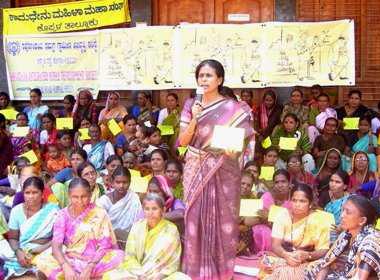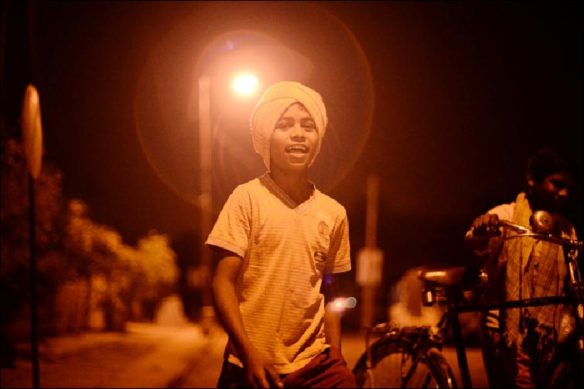Grama Panchayat Hakkottaya Andolana
The Grama Panchayat Hakkottaya Andolana is a movement of representatives of the Grama Panchayat and Grama Sabhas of Karnataka, devoted to securing and safeguarding the principles of democratic decentralisation and devolution of power enshrined in the Constitution and to strengthen these institutions, especially at the grassroots level by empowering people’s representatives to become effective instruments of development and social justice.
The Grama Panchayat Hakkottaya Andolana is a platform for members of Grama Panchayats and Grama Sabhas to come together to improve democratic decentralised governance at the village level; increase accountability of elected representatives to their constituencies; implement mechanisms for improved transparency; and free these structures of corruption and vested interests.
The Secretariat of the Grama Panchayat Hakkottaya Andolana is housed in The Concerned for Working Children. Click here for the website of Grama Panchayat Hakkottaya Andolana in Kannada.
Please visit the Grama Panchayat Hakkottaya Andolana website for more details.
Values of the Grama Panchayat Hakkottaya Andolana
- Is not against any political party or individual. It is to strengthen and protect democratic decentralisation against any moves to weaken it.
- Aims to be a process of education through discussion, debate and dialogue.
- Aims to uphold, protect and nurture participatory democracy;
- Abides by and fulfils our moral and legal obligations to our Constitution;
- Protects and promotes strong, decentralised government;
- Maintains and upholds peace and non-violence at all time;
- Ensures that no inconvenience or damage is caused to individuals, public/private property and the environment as a result of our campaign; and
- Is inclusive, egalitarian and democratic.
The formation of the Andolana
The Andolana was formed in 2007, in response to the passage by the Karnatka Legislature of the Karnataka Panchayat Raj (Amendment) Bill. The bill removed from Grama Sabhas and Grama Panchayats the role of identifying beneficiaries for government programmes, passing this right onto “any Committee or authority of the Government constituted in this behalf”.
This move was ill-judged in both principle and practice. Not only was it counter to the spirit and letter of the 73rd Amendment, but it removed responsibility for identifying the beneficiaries of programmes from those best suited to the task – the neighbours of the beneficiaries themselves – and passed it to unelected, far-off bureaucrats with little connection to people’s lives.
In May 2007, members of Panchayats from all over Karnataka, facilitated by CWC, gathered and declared the formation of the Grama Panchayat Hakkottaya Andolana in opposition to the bill. CWC serves as the convener and secretariat to the organisation.
The Andolana organised demonstrations in several districts across Karnataka to protest the bill. More than 1,50,000 signatures in opposition were collected and sent to the Governor of Karnataka. The protest was a success: the Governor vetoed the bill, returning it to the Legislature with a strongly-worded note of objection to the change.
2010 elections
The Andolana has continued to work to defend and strengthen local democracy. In 2010 it launched a major state-wide campaign to demand timely elections for Grama Panchayats. Elections were due in April, but as in previous election years, the State Election Commission failed to call elections by the allotted date – and refused to say when elections would take place. In March, the State Panchayat Raj Ministry issued an order appointing administrators to run villages whose Grama Panchayats’ terms were expiring. It was clear that the Government intended to use the delay in elections to take through administrative fiat the powers it had been unable to claim through legislation.
The Andolana launched a major statewide campaign to demand immediate elections and the recall of administrators. Once again, rallies were held across Karnataka, and an editorial was published in the Deccan Herald. The campaign had the support of the international NGO ActionAid and the Association of Local Government in India.
Ultimately, the State Election Commission announced elections in May.
‘My vote is not for sale’
The Andolana was formed not just to defend local democracy, but to strengthen it. Having ensured that elections would take place, the Andolana focused on making them as fair and democratic as possible by launching a campaign against corruption. The campaign, Namma Matha Maratakilla (‘My vote is not for sale’), aimed to educate voters against accepting illegal gifts or payments for casting their votes for a particular candidate. Voters were invited to pledge ‘My vote is not for sale’, and display posters in support of the campaign to send a clear signal to the political parties that the elections could not be bought. The Andolana also worked with voters to identify ‘concensus candidates’ who embodied the principles of good governance and supported them to stand without the funds of the big political parties. Over 700 such candidates were successful in the elections.
Read a campaign note about ‘My vote is not for sale.’
Grama Swaraj Samavesha
In December 2011, the Andolana held its first Grama Swaraj Samavesha (trans?), a state-wide convention with delegates representing Panchayats from all over Karnataka. Held in Udupi, the Samavesha saw over 5000 delegates gather to debate the future of local democracy in Karnataka. Debating motions and listening to guest speakers, the delegates discussed how to obtain from the state government a commitment to the spirit of grassroots democracy and effective decentralization, and initiate action towards removing all legal and administrative hurdles to achieving true decentralization. They also discussed how to operate and communicate more effectively in local government, and be more accountable to communities.
On the final day of the Samavesha, eight resolutions were passed, each with resounding support, resolving to breathe new life into Panchayati Raj institutions across the state. Sri Jagdish Shettar, then the State Minister of Panchayati Raj (now Chief Minister), accepted the resolutions on behalf of the State, while committing himself and his authority to protecting the rights of Grama Sabhas in the selection of beneficiaries and assuring the Panchayat representatives of his support at all times.
See a video of Sri Shettar’s address:
The following publications are available in relation to the Samavesha. Please email cwc@pobox.com to obtain copies.
- Souvenir of the Grama Swaraj Samavesha, 2011 (Kannada and English)
- Compendium of the Grama Swaraj Samavesha, 2012 (Kannada and English)
- Resolutions for Pre-Budget Session, 2012 (Kannada and English)
- Udupi Resolutions, 2011 (Kannada and English)
2012 Budget campaign
In 2012 the Andolana has been forced to mobilise to defend local democracy again. The draft State budget for 2012 severely curtailed funding for rural development and for Panchayati Raj institutions, allocating less funds for development in rural areas – where the majority of Karnatakans live – than for rural areas. To make matters worse, a recent government order required Panchayats to spend 60% of their ‘untied’ funds on past electricity dues and 40% for staff salaries, leaving them with effectively no discretionary funding.
Shri Damodar Acharya, General Secretary of Grama Panchayat Hakkottaya Andolana and a co-founder of CWC, says that the order “makes a complete mockery of democratic decentralisation. Drought is prevelant in this State, and the Panchayats are the ones who are solving these issues at the local level. We must be empowered. This is a constitutional right for us.” In addition, the Panchayat Raj (Amendment) bill that first inspired the Andolana is being re-introduced into the legislature.
In July, the Andolana gathered 8000 members for a peaceful rally in Bangalore’s Freedom Park. Addressed by notable supporters, including eminent freedom fighter Shri H.S. Doreswamy, the crowd successfully demanded that Minister of Rural Development and Panchayati Raj, Shri Eshwarappa, attend and hear their concerns. Read more about the Freedom Park protest.



